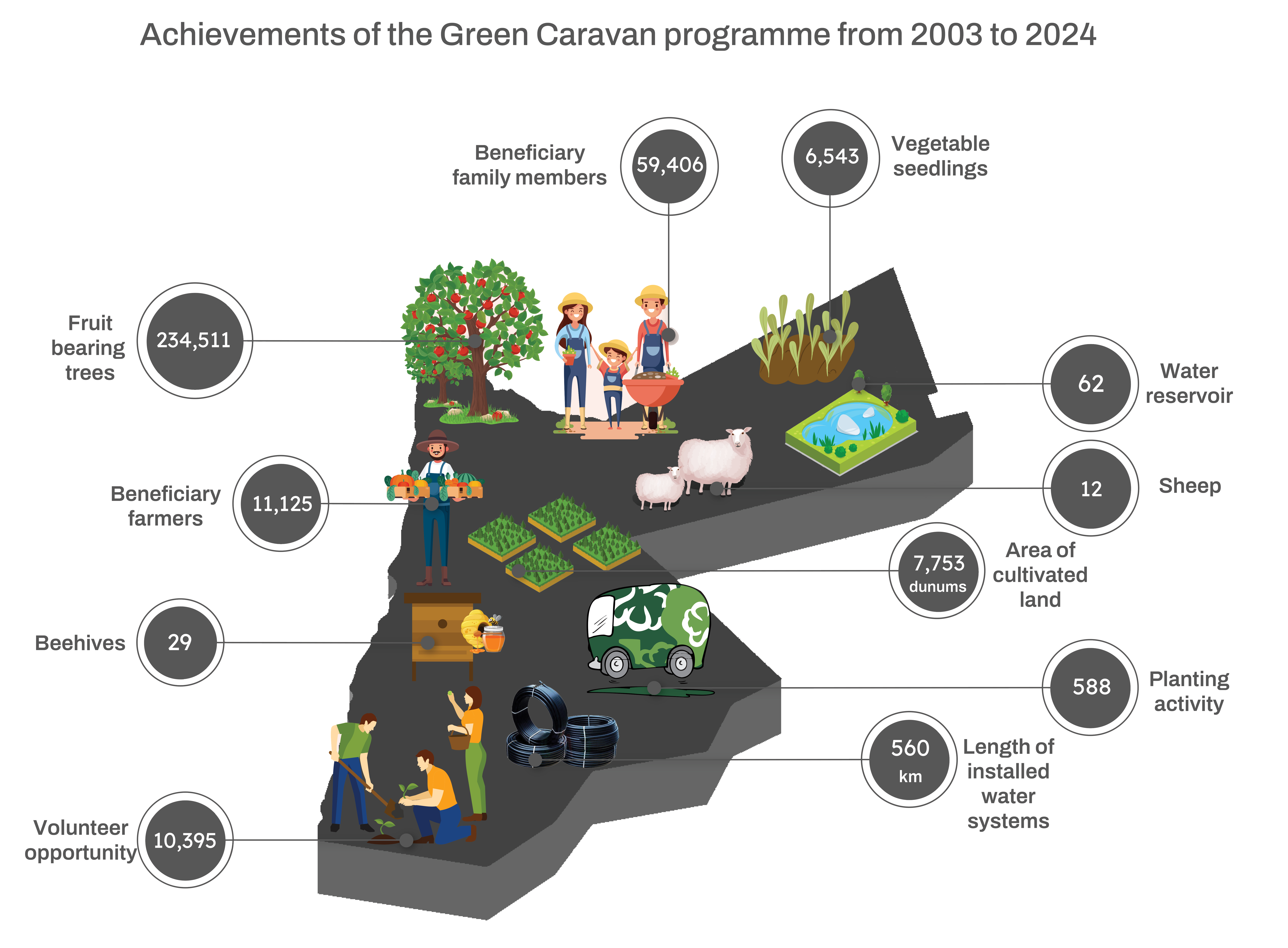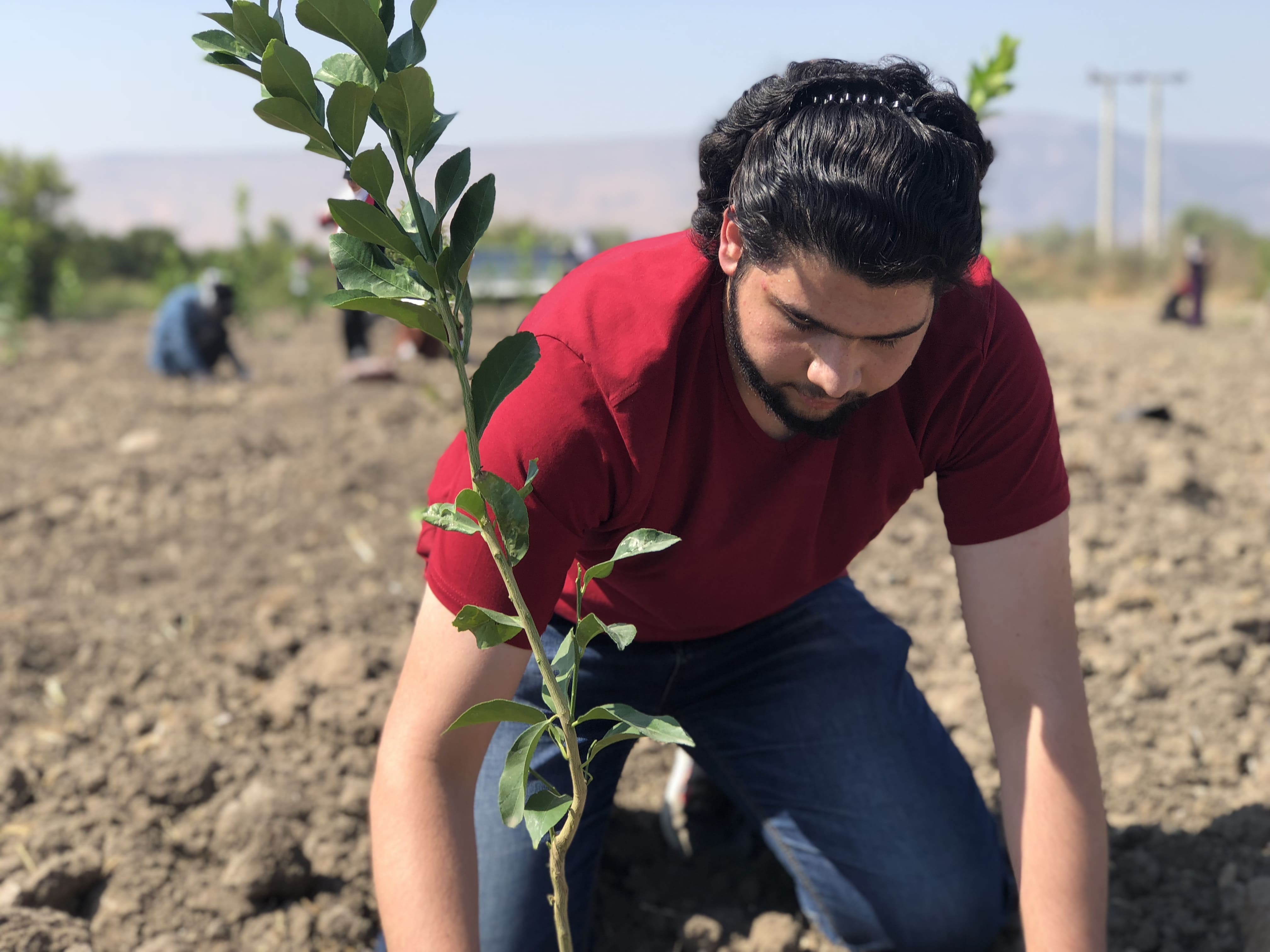The Green Caravan
The Green Caravan Program in Jordan:
The Arab Group for the Protection of Nature launched the Green Caravan program in 2003 to reduce the rate of desertification, highlight the importance of agriculture and support small-scale farmers. These aims are the key components to improve Jordan’s food basket.
The Green Caravan has achieved several significant and tangible successes, including:
- Planting fruit trees and expanding green areas: By the end of 2024, over 234,511 fruit trees were planted, including olive, citrus, stone fruits, and grape trees, covering an area of approximately 6,543 dunums.
- Improving living conditions for local families: More than 11,125 families, totaling 59,406 individuals, have benefited from our projects.
- Enhancing water resource management and reducing water loss: 62 water collection ponds were constructed, and over 560 kilometers of irrigation networks were extended, improving water resource management and providing sustainable water sources for irrigation. This effort has positively impacted agricultural productivity and improved infrastructure.
- Combating climate change: Through the large-scale planting of trees, more than 5,008,889 kilograms of carbon dioxide are absorbed annually. This achievement reflects the programme's commitment to combating climate change by reducing carbon emissions.

Objectives:
- Enhance food security and food sovereignty by planting fruit-bearing trees.
- Combat desertification to mitigate the effects of climate change.
- Encourage local production and promote sustainable economic development.
- Provide a sustainable source of income for farmers to combat poverty and unemployment.
- Raise awareness about the importance of planting trees and environmental protection.
- Encourage the participation of students in environmental volunteer activities and provide a space for local community building.
-
Provide a recreational space for the local community.
The Green Caravan’s Pillars:
- Strong partnerships between civil society and the public and private sectors. For each targeted area, a small committee is formed to oversee planning and implementation, where local communities are put at the center of decision-making.
- Sustainable resource management: the program only selects trees that are suitable for the target area, ensures there is an accessible source of water and efficient irrigation techniques.
- Social justice orientation prioritizing small-holder farmers.
- Promotion of environmental, economic and social links by planting fruit trees that have high economic and nutritional value.
- Protection of human beings, who are an integral part of the environment.
The Green Caravan has also pushed to revitalize the concept of ‘Hakoura’; a homestead garden that is emblematic of the traditional culture of farming. This concept is essential for achieving food sovereignty in Jordan.
Working Mechanism:
- Meetings with farmers and their local communities to introduce them to the project.
- An independent committee conducts field surveys and processes applications for proposed beneficiaries according to the following criteria:
- Households whose main source of income is agriculture;
- Households with low-income and/or unemployment;
- Households headed by women;
- Households with individuals with disabilities;
- Households with university students;
- Availability of water sources.
- Visit target sites to select crops and ensure readiness for planting.
- Visit nurseries to check compliance with technical specifications and quantities needed for planting.
- Volunteers (students, employees, entrepreneurs, the local community) carry out the planting after being given necessary instruction.
- Documentation of project data.
- Periodic visits to monitor projects, ensure their sustainability and assess their impact.
Where do we plant:
Planting takes place on the lands of low-income and small farmers, particularly in the Jordan Valley (North, Central, and South), which is considered Jordan’s food basket. It also includes other agricultural cities such as Madaba, Irbid, Jerash, Ajloun, Mafraq, Amman, Salt, Tafileh, Karak, and even Aqaba, among other locations.








